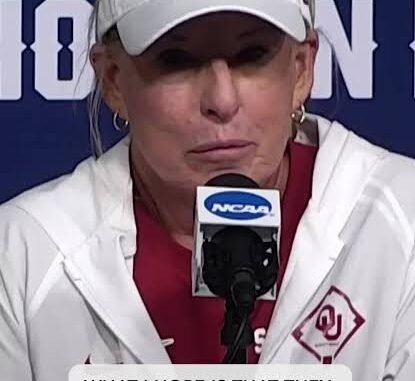
Oklahoma’s Patty Gasso Calls Out NCAA Over WCWS Format: ‘Unfair for the Athletes’…Read More…
OKLAHOMA CITY — In a candid and passionate postgame press conference at the Women’s College World Series (WCWS), legendary Oklahoma softball coach Patty Gasso delivered a blistering critique of the NCAA’s tournament format, calling it “unfair,” “outdated,” and “disrespectful to the athletes.” Her remarks have since ignited widespread debate across the collegiate sports landscape.
Gasso, whose Sooners are chasing their fourth consecutive national championship and eighth overall under her leadership, did not hold back following her team’s hard-fought 4-3 win over UCLA that stretched late into the Oklahoma night. While visibly proud of her players, Gasso used the moment to shine a spotlight on what she says is a growing problem that’s being ignored by the NCAA.
“This isn’t just about Oklahoma. This is about every athlete out there pouring their heart into this sport,” Gasso said. “These young women deserve better. They deserve rest, respect, and a schedule that puts their health and performance first.”
The WCWS Format Under Scrutiny
At the heart of Gasso’s frustration is the current double-elimination format that compresses multiple high-stakes games into an incredibly tight time window, often forcing teams to play back-to-back games with little recovery time. The NCAA’s current schedule has been criticized in the past, but Gasso’s comments represent one of the most direct and high-profile calls for reform in recent memory.
The Women’s College World Series — held annually in Oklahoma City — brings together the final eight teams from the NCAA softball tournament. The event, lauded for its electric energy and soaring television ratings, features a grueling bracket structure. Teams often play games late into the night, only to turn around and compete again the next morning or afternoon, with little regard for player recovery.
“Would this happen in men’s sports? No. And we all know it,” Gasso said bluntly. “The NCAA has the power to fix this, and they haven’t. That tells you all you need to know.”
Her comments echoed concerns from other coaches and players throughout the tournament. Florida State’s head coach, Lonni Alameda, voiced similar frustrations earlier in the week, noting that her players had only 14 hours between two crucial elimination games.
“Our pitchers are being asked to do superhuman things,” Alameda said. “This isn’t just tough — it’s borderline unsafe.”
Athlete Health and Performance at Risk
The compressed format has serious implications not only for player health but also for the quality of play. Pitchers, in particular, shoulder the heaviest burden, often logging double-digit innings over consecutive days with limited rest. Many of these athletes are dealing with nagging injuries, overuse stress, and the mental toll of playing in front of packed stadiums and national TV audiences.
Gasso highlighted Oklahoma’s own struggles with managing pitch counts and fatigue, especially as they’ve had to rely on their bullpen more heavily during this year’s tournament. Star pitcher Jordyn Bahl was visibly exhausted during her relief appearance against UCLA, having pitched two complete games in the previous 36 hours.
“I’ve coached long enough to know when my players are pushing past their limit,” Gasso said. “We’re lucky no one’s gotten seriously hurt. But we’re playing with fire.”
An Uneven Playing Field
Another major point of contention is the apparent inequity between the men’s and women’s postseason formats. The Men’s College World Series (MCWS), held in Omaha, allows for rest days between games and a more spaced-out bracket. The women, Gasso argues, deserve the same treatment.
“Why are the men given rest days, and the women aren’t?” she asked. “Is our tournament less important? Are our athletes less valuable? The answer is no, and yet the format says otherwise.”
Her remarks drew immediate support across social media, with #FixTheFormat trending on X (formerly Twitter) within hours. Fans, analysts, and former players shared their stories, videos, and messages urging the NCAA to reconsider the structure of the WCWS.
NCAA’s Response
In response to the growing outcry, NCAA spokesperson Karen Holtz issued a brief statement late Wednesday night:
“The NCAA values the health and safety of all student-athletes and is continually evaluating tournament structures to ensure competitive fairness and optimal experience. Any proposed changes to championship formats will be reviewed by the appropriate committees during the offseason.”
The statement did little to quell the frustration among teams and fans, many of whom feel that the NCAA has long overlooked the women’s game despite its growing popularity.
Television ratings for the WCWS have consistently broken records, with last year’s championship series drawing over 2 million viewers per game — surpassing several MLB and NBA matchups. The atmosphere at USA Softball Hall of Fame Stadium is electric, with tickets selling out months in advance and fans traveling from across the country.
“This is not a niche event anymore. This is a major national tournament. Treat it like one,” said ESPN analyst and former Olympian Jessica Mendoza.
Looking Ahead
While the NCAA has not committed to specific changes, the momentum for reform appears stronger than ever. Gasso’s willingness to speak out — while still competing for a national title — underscores just how critical the issue has become.
“We’re not asking for luxury,” Gasso said as she concluded her remarks. “We’re asking for fairness. For these women, who train year-round, make enormous sacrifices, and represent their schools with pride — they deserve that.”
As Oklahoma gears up for their next showdown in the WCWS, one thing is clear: the conversation Patty Gasso started isn’t going away. And whether or not her team adds another trophy to their dynasty, she may have already scored the most important win of the tournament — bringing national attention to a broken system.
Leave a Reply